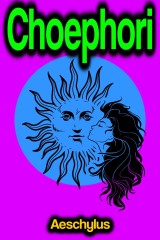Details

Choephori
|
3,49 € |
|
| Verlag: | Phoemixx Classics eBooks |
| Format: | EPUB |
| Veröffentl.: | 02.11.2021 |
| ISBN/EAN: | 9783986771706 |
| Sprache: | englisch |
| Anzahl Seiten: | 111 |
Dieses eBook enthält ein Wasserzeichen.
Beschreibungen
Choephori Aeschylus - Also known as 'The Libation Bearers' this is the second play of Aeschylus' Oresteia trilogy. Many years after king Agamemnon's murder at the hands of his wife Clytamnestra and her lover Aigisthos, his son Orestes returns home with Pylades to mourn at his grave. He has been living in exile and has come back to Argos in secret; his mission is to avenge Agamemnon's death.Orestes arrives at the grave of his father, accompanied by his cousin Pylades, the son of the king of Phocis, where he has grown up in exile; he places two locks of his hair on the tomb. Orestes and Pylades hide as Electra, Orestes' sister, arrives at the grave accompanied by a chorus of elderly slave women (the libation bearers of the title) to pour libations on Agamemnon's grave; they have been sent by Clytemnestra in an effort to ward off harm. Just as the ritual ends, Electra spots a lock of hair on the tomb which she recognizes as similar to her own; subsequently she sees two sets of footprints, one of which has proportions similar to hers. At this point Orestes and Pylades emerge from their hiding place and Orestes gradually convinces her of his identity.
Aeschylus, an ancient Greek playwright, is often recognized as the father or the founder of tragedy. He is the earliest of the three Greek tragedians whose plays survive extant, the others being Sophocles and Euripides. According to Aristotle, he expanded the number of characters in plays to allow for conflict among them; previously, characters interacted only with the chorus. Unfortunately, only seven of an estimated 70 plays by Aeschylus have survived into modern times; one of these plays, Prometheus Bound, is sometimes thought not to be the work of Aeschylus.At least one of Aeschylus's works was influenced by the Persian invasion of Greece, which took place during his lifetime. His play The Persians remains a good primary source of information about this period in Greek history. The war was so important to Greeks and to Aeschylus himself that, upon his death around 456 BC, his epitaph included a reference to his participation in the Greek victory at Marathon but not to his success as a playwright.There are no reliable sources for the life of Aeschylus. He was said to have been born in c. 525 in Eleusis, a small town about 27 kilometers northwest of Athens, which is nestled in the fertile valleys of western Attica, though the date is most likely based on counting back forty years from his first victory in the Great Dionysia. His family was both wealthy and well-established; his father Euphorion was a member of the Eupatridae, the ancient nobility of Attica.As a youth, he worked at a vineyard until, according to the 2nd-century AD geographer Pausanias, the god Dionysus visited him in his sleep and commanded him to turn his attention to the nascent art of tragedy. As soon as he woke from the dream, the young Aeschylus began writing a tragedy, and his first performance took place in 499 BC, when he was only 26 years old. After fifteen years, his skill was great enough to win a prize for his plays at Athens' annual city Dionysia playwriting competition. But in the interim, his dramatic career was interrupted by war. The armies of the Persian Empire, which had already conquered the Greek city-states of Ionia, entered mainland Greece in the hopes of conquering it as well.In 490 BC, Aeschylus and his brother Cynegeirus fought to defend Athens against Darius's invading Persian army at the Battle of Marathon. Though Athens was victorious, Cynegeirus died in the battle. Aeschylus continued to write plays during the lull between the first and second Persian invasions of Greece, and won his first victory at the city Dionysia in 484 BC. In 480 he was called into military service again, this time against Xerxes' invading forces at the Battle of Salamis. This naval battle holds a prominent place in The Persians, his oldest surviving play, which was performed in 472 BC and won first prize at the Dionysia.
















